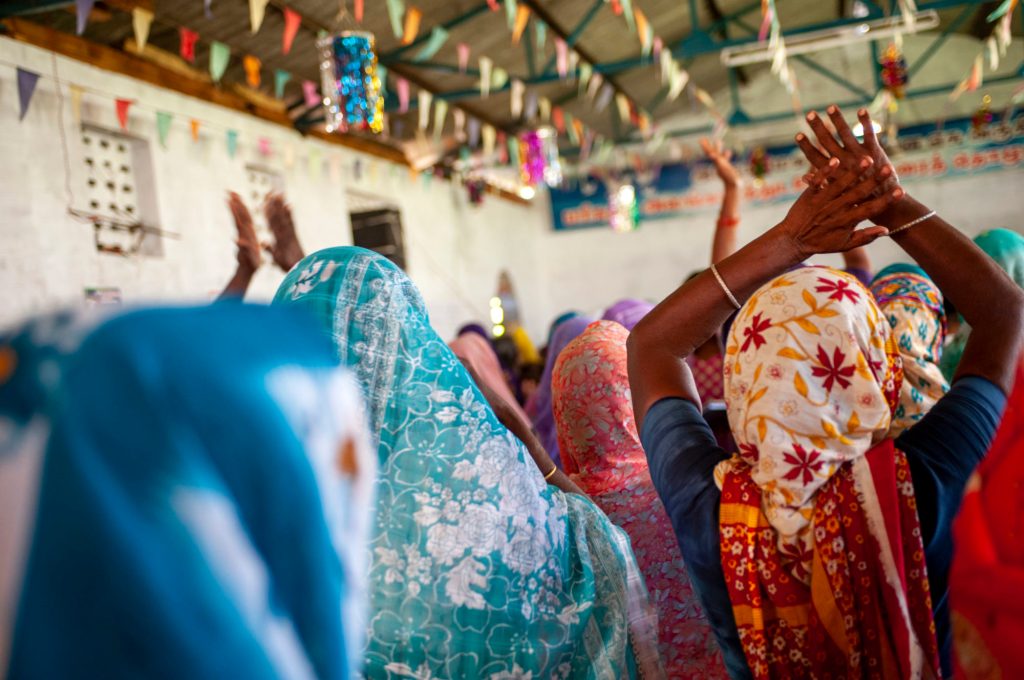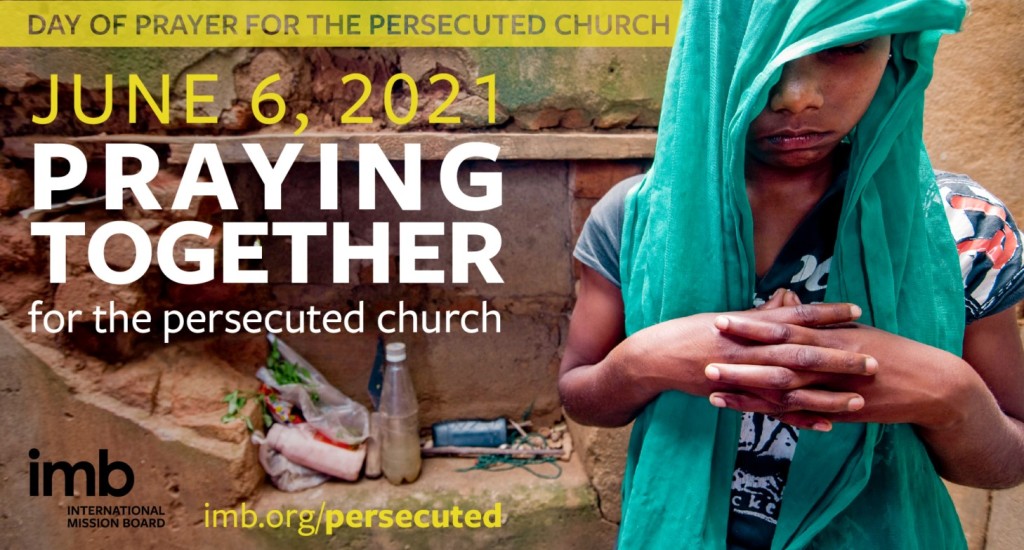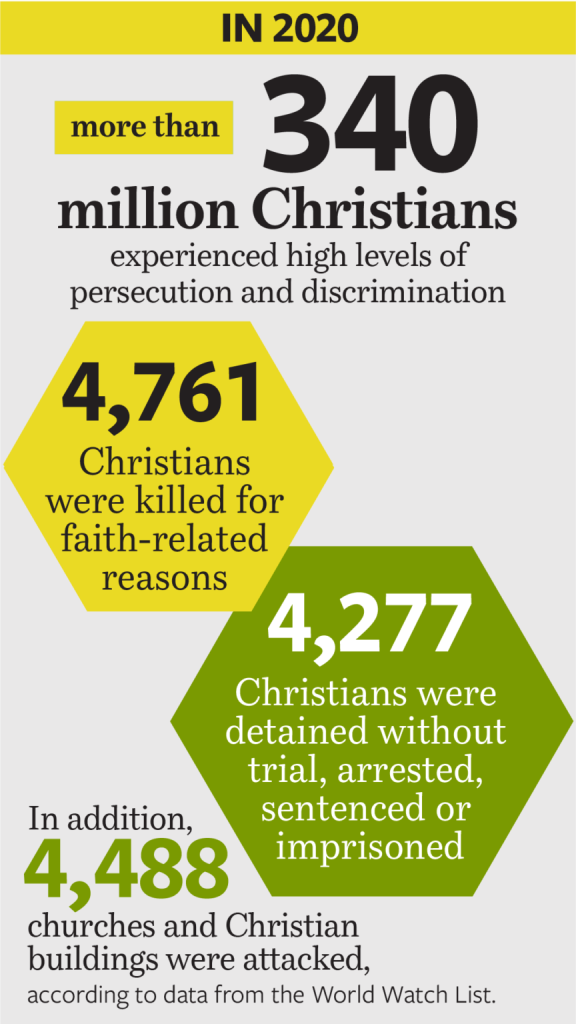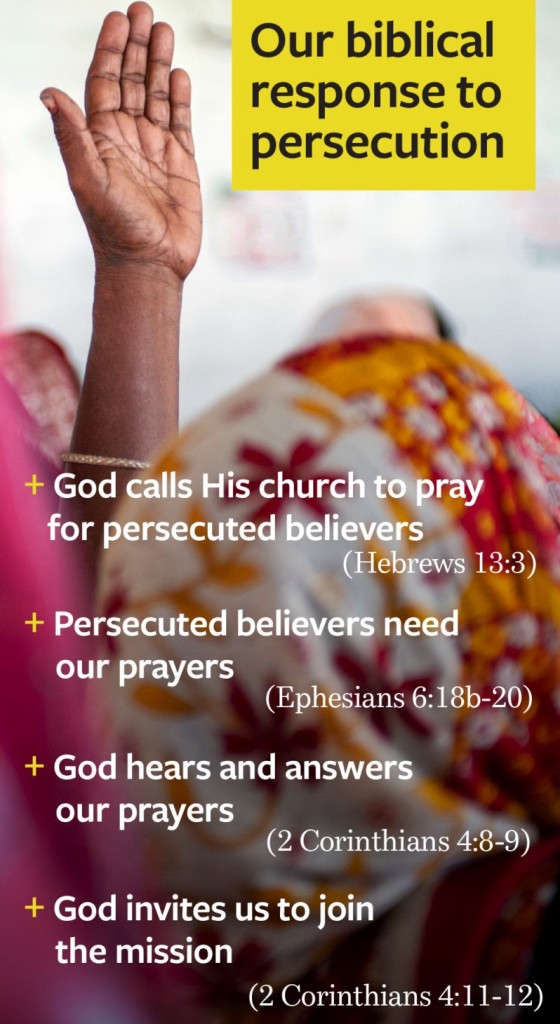Imprisoned and Persecuted
Posted: June 28, 2021 Filed under: People | Tags: christians, imprisoned, muslims, persecution, prison Leave a comment“Continue to remember those in prison as if you were together with them in prison, and those who are mistreated as if you yourselves were suffering.” (Hebrews 13:3)
The Christians in one Muslim region are working hard in recent days to support their brothers and sisters who have been imprisoned for their faith. Though scattered because of current persecution, they send cryptic messages through social media and text apps and try their best to keep each other informed.
Many of these believers live in different cities or even countries. In the last six months, their messages often speak of the rise of persecution and how to care for those in prison. Thirteen among one people group—that missionary workers know about—have recently been jailed.
One national couple was arrested last year for openly sharing their faith. The wife had recently given birth and was led to prison with her newborn. Separated from her husband, she was expected to care for herself and the infant in a dirty prison cell. Days turned into weeks and then into months as authorities used the time to find evidence against them.
Her husband underwent regular beatings, and not just at the hands of guards. Missionary workers explain that it’s not unusual for authorities to bring in family members to try to persuade a believer to recant their faith in Christ and turn back to Islam. Families often spew rejection and hatred toward the individual and will add physical beatings to the emotional abuse. The shame they say brought to them by the family member choosing to follow Jesus is great.
The goal of the government and the family is the same—to stop the spread of Christianity.
This couple was brought to trial and shortly after deported to another country. For the believing community, the work to protect and provide for their brothers and sisters is a high priority, though challenging since they cannot meet or openly discuss current circumstances. When the couple was forced to leave their home country, they faced many challenges, including being reunited with their other two children who were not imprisoned with them.
Their faith community worked to provide trusted transportation and a safe location. Putting themselves at risk, they brought their children to them and helped the couple with post-trauma care and emotional support. These situations have been much too common lately, but even in these dark circumstances, God continues to be glorified.
“Out of those we know who have been arrested recently, 100% have refused to renounce their faith,” said one worker. This commitment energizes the national believers, and they have been able to provide support for each other, though they are also daily at risk of arrest and persecution.
“For all of these people, they are in prison for being faithful to share the gospel,” another worker emphasized. “The persecuted church is persecuted for doing what God wants us to do. These brothers and sisters who have been incarcerated over these last six months have modeled that in a really healthy way.”
- Pray for the believers who are currently in prison. Ask God that they will remain steadfast in their faith and will find favor with authorities.
- Thank God for the response of His church in this area, who put themselves at risk to care for each other.
- Ask God to break through the barriers to sharing His truth in this region and for His glory to shine above the darkness of persecution
Women Strengthen One Another
Posted: June 20, 2021 Filed under: People | Tags: lipti, liz karwood, muslims, women Leave a commentMissionary Liz Karwood reports that in the area of South Asia where she serves, the lostness can feel staggering. She understands that her team can’t even begin to reach the 25 million Muslims in her region without involving other believers. She also understands that “God is working and is bigger than the task in front of us.” Faced with multitudes of people who do not know Jesus, her team has intentionally focused on evangelism training and building partnerships with South Asian believers in the missionary task.
Karwood tells of one missionary training where only two women attended. One woman was a pastor’s wife. Another woman, Lipti, was a local believer who attended though she had to bring her six-month-old son. The first part of the training includes how to start a conversation with a Muslim and share the gospel. The second part of the training includes heading out to the streets to practice.
Going out to engage people with the gospel can be intimidating for some, and Karwood says that she often faces excuses when people are asked to actively go out and share their faith. She assumed that Lipti would have a good excuse since she was caring for her son, but she seemed the most eager and convinced the pastor’s wife to also join. Karwood and her friends ventured into the neighborhood, praying for opportunities to start gospel conversations.
Neither of these women had ever shared the gospel with a Muslim and didn’t even know where Muslims lived in the area.
“We just started walking toward the neighborhood market and praying to find some Muslim ladies,” Karwood said. In the heat of the day, no one was outside, but they ventured into a hair salon in an area marked with green flags. Green is a holy color for Muslims and is often a sign of areas where Muslims live and work.
Inside the salon, Karwood chose to have her eyebrows shaped as a way to begin a conversation with one of the salon workers. As the opportunity to speak clearly about the gospel became evident, Karwood said to Lipti, “Your language is so much better than mine. Why don’t you tell these ladies how they can have forgiveness of sin?”
Lipti then started to share the gospel with the salon worker, explaining that we have to believe in Jesus’ death as payment for the forgiveness of our sin. As Lipti spoke, the salon worker stopped her and called out for women in the back of the salon to come hear about Jesus, too. Lipti, still holding her baby, continued to share the story of Jesus to the six women who gathered.
None of those women decided to follow Jesus that day, but Lipti now understood the significance of the training and how the good news of Jesus could be shared. As they left the salon, Lipti said, “Wow! I never knew it was so easy to share the gospel. Let’s go find someone else.”
As they walked toward the training site, they passed a woman selling coconuts on the side of the street. Lipti asked Karwood to hold her son, while she told the woman about Jesus. “I’ve never been happier to partner with a national believer,” Karwood said.
“That day I was amazed to see how God was calling more laborers like Lipti into the harvest field. She, like many other believers in South Asia, is taking ownership of the core missionary task.”
Karwood encourages others to consider their role in the missionary task and to show the same enthusiasm and boldness as Lipti did in sharing about Jesus.
Day of Prayer June 6th
Posted: June 2, 2021 Filed under: Cities, People | Tags: day of prayer, eleanor witcher, john brady, naomi, Nik Ripken, paul chitwood, persecution Leave a commentThe “International Mission Board” is collaborating with “Nik Ripken Ministries” to raise awareness about current religious persecution through the “Day of Prayer for the Persecuted Church.”
This Southern Baptist Convention wide initiative will be observed on June 6, 2021. It is a call for Southern Baptists to increase their awareness of and pray fervently for the global “persecuted” church.
In 2020, more than 340 million Christians experienced high levels of persecution and discrimination. Also last year, 4,761 Christians were killed for faith-related reasons, and 4,277 Christians were detained without trial, arrested, sentenced or imprisoned. In addition, 4,488 churches and Christian buildings were attacked, according to data from the World Watch List.
“As our Southern Baptist missionaries take the gospel to the most difficult-to-reach peoples and places around the world,” Paul Chitwood, president of the IMB, said, “they are witness to the suffering of those who boldly follow Jesus and are constantly confronted by those who persecute the Lord’s church.”
“While our hearts break for our brothers and sisters in Christ who endure persecution and even martyrdom, we often feel powerless to help them. But we aren’t! We serve the One who, as Job declared, ‘makes nations great, and he destroys them; he enlarges nations, and leads them away,’” Chitwood continued. “When we pray for those who are suffering, we have access to the One who can sustain them, comfort them and bring them justice.”
Persecution of the global church comes most fiercely from within a believer’s own family, John Brady, the IMB’s vice president for global engagement, explained. However, many believers are facing intense persecution from opposing religious groups and their governments as well.
Familial persecution is evident in the life of Naomi, a Deaf widow. COVID-19 forced her to move out of her city in Indonesia back home to a remote island. There, she converted from Islam to Christianity after working with an IMB Deaf translation team in her former city. Her parents were irate, and her dad locked her in his home and beat her daily, trying to get her to abandon her newfound faith.
Because of her daily beatings, she developed serious health complications. As she was being treated in a city six hours away, her 9-year-old daughter reached out to her mother’s church leaders for prayer. Naomi eventually recovered, and her daughter has been able to see the Lord work in her mother’s life.
However, Naomi, like so many other believers around the world, still needs prayer for her situation.
“Don’t pray for our persecution to end,” a missionary reported a national believer saying. “Pray that we will be obedient through our suffering.”
Nik Ripken, author of “The Insanity of God” and IMB missionary emeritus, explained that the main cause of persecution globally is when individuals profess Christ as Savior. Ripken has spent more than two decades studying global persecution and collecting stories from persecuted believers.
“If believers and their churches simply pray to God for persecution to end, the only way for God to answer that type of prayer is to stop people from following Jesus,” Ripken explained.
“Rather, we pray for persecuted believers to remain obedient through their suffering, and we seek to identify with persecuted believers by sharing our faith in whatever environment we find ourselves.”
Eleanor Witcher, director of the IMB’s Prayer Office, believes that one of the primary prayer needs for the persecuted church is discipleship.
“Pray that the roots of new believers, and believers who are weak in their knowledge of the Word, will quickly grow deep in Scripture as they learn to abide in Christ so that these new believers will stand firm under any persecution they may face,” Witcher said.
Witcher emphasized that this need for discipleship, growth in the Word and increased evangelism is something that all believers, not just persecuted believers, must cultivate in their own lives.
In praying for the global persecuted church, “first, we pray for ourselves that our perspective will be aligned to God’s will and then we pray for our brothers and sisters who are suffering for the glory of Christ,” Witcher said.
Southern Baptists are invited to join in prayer in the weeks leading up to the “Day of Prayer.” Specifically, believers can pray for:
- the church to pray faithfully and fervently in accordance with God’s Word and will.
- followers of Christ to consistently study and obey Scripture so they are spiritually prepared when persecution comes.
- church leaders to boldly proclaim the gospel in the face of opposition.
- the persecuted, that they have the strength to live in the power, love and sound mind that God alone can provide.
- those who are brutalized to sense the Lord’s love surrounding them and respond to those who have injured them with grace and dignity.
- the global church to commit their hearts and time in prayer and fasting for the persecuted church.
- each church to keep their focus on the glory of God and growth of His church.
Ripken believes that God’s highest purpose in persecution is to call His people to Himself, to refocus their attention to the suffering of their Lord.
“When followers of Christ suffer willingly for their Savior, it gives their faith value,” Ripken added. “That kind of suffering also increases witness.”
Join other believers across the Southern Baptist Convention by committing to pray for the persecuted church. Visit imb.org/persecuted and sign up to receive a free prayer guide.








